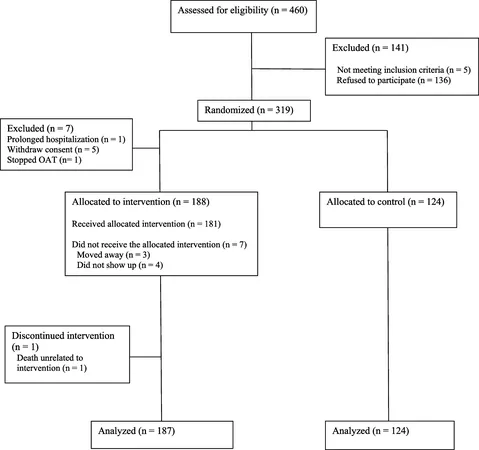
Could Fruit Smoothies Hold the Key to Better Mental Health for Opioid Dependents?
2025-08-29
Author: John Tan
Introduction: A Unique Quest for Wellness
In the complex world of opioid dependence, where unhealthy diets often reign, researchers are exploring innovative solutions. A recent study investigated whether daily fruit smoothie supplementation could bolster mental health for individuals undergoing opioid agonist therapy (OAT). While the benefits of fruit-rich diets are well-documented, their impact on those in recovery from addiction has remained largely unexplored.
The Study: What Went Down?
In a groundbreaking multicenter randomized controlled trial dubbed FruktBAR, 311 participants were split between a smoothie-loving intervention group receiving a daily 250ml fruit smoothie and a control group sticking strictly to standard OAT for 16 weeks. Researchers aimed to evaluate changes in psychological distress using the Hopkins Symptom Checklist (SCL-10%)—a tool to measure mental health states—alongside fatigue, physical fitness, and specific nutrient biomarkers.
The Sweet Results: Were Expectations Met?
Despite enthusiasm, the results were underwhelming. Participants in both groups entered the trial with high levels of psychological distress—around 70% reported low fruit and vegetable intake. By the end, the distress scores dropped only marginally, with no significant difference between the smoothie group and those in standard treatment. Additionally, fatigue levels, physical fitness, and nutrient markers for folate and carotenoids showed minimal change.
Why Didn't It Work? Understanding the Shortcomings
While the smoothie supplementation was operationally successful, actual consumption fell short of expectations—participants averaged just 3.9 smoothies a week instead of the intended daily intake. Factors such as food insecurity, poor oral health, and other socioeconomic challenges may have overshadowed the potential benefits of the intervention.
Diving Deeper: The Complexity of Substance Use and Nutrition
For those battling substance use disorders (SUDs), the road to recovery is fraught with psychological, social, and physical barriers. Many struggle with unhealthy eating habits, driven by stress and marginal access to nutritious food. This study illustrates that simplistic solutions, like introducing smoothies, might not tackle the multifaceted issues these individuals face. Furthermore, previous studies hint at promising mental health improvements from healthy diets, but their effectiveness in serious contexts like addiction treatment requires a more nuanced approach.
Conclusion: A Call for Comprehensive Interventions
Though fruit smoothies didn’t yield the desired mental health boosts, this research opens the door for wider inquiries into nutritional strategies for people in recovery. Moving forward, integrating sustainable and long-term dietary interventions with standard treatment protocols could enrich the lives of those battling opioid addiction. It's a reminder that addressing mental health isn’t just about what you eat—it's also about understanding the social and economic contexts that shape recovery.
Final Thoughts: The Journey Ahead
As researchers aim for more effective solutions, the path is clear: complex interventions acknowledging the intertwined nature of nutrition, mental health, and socioeconomic factors are essential. For the opioid-dependent community, the quest for optimal wellness continues, armed with knowledge and hope for better futures.




 Brasil (PT)
Brasil (PT)
 Canada (EN)
Canada (EN)
 Chile (ES)
Chile (ES)
 Česko (CS)
Česko (CS)
 대한민국 (KO)
대한민국 (KO)
 España (ES)
España (ES)
 France (FR)
France (FR)
 Hong Kong (EN)
Hong Kong (EN)
 Italia (IT)
Italia (IT)
 日本 (JA)
日本 (JA)
 Magyarország (HU)
Magyarország (HU)
 Norge (NO)
Norge (NO)
 Polska (PL)
Polska (PL)
 Schweiz (DE)
Schweiz (DE)
 Singapore (EN)
Singapore (EN)
 Sverige (SV)
Sverige (SV)
 Suomi (FI)
Suomi (FI)
 Türkiye (TR)
Türkiye (TR)
 الإمارات العربية المتحدة (AR)
الإمارات العربية المتحدة (AR)